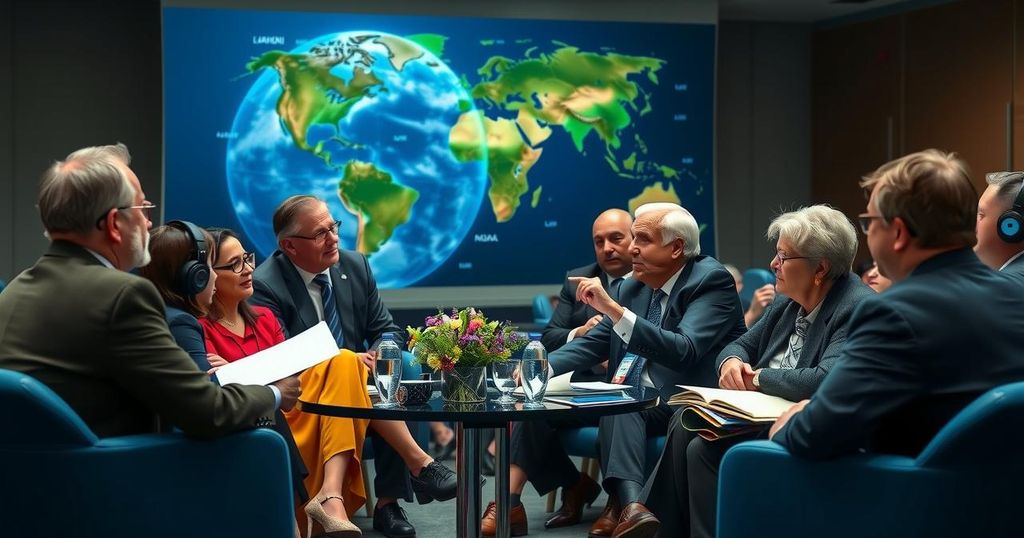G20 Summit in Brazil: Addressing Global Conflicts and Climate Change Challenges

Leading global figures are convening in Rio de Janeiro for the G20 summit, addressing key topics such as the conflicts in the Middle East and Ukraine, climate change initiatives, and the implications of Donald Trump’s political resurgence. Brazilian President Lula da Silva has initiated discussions aimed at combatting poverty and promoting environmental responsibility, though skepticism surrounds the potential for substantial agreements amid geopolitical divisions.
The G20 summit in Rio de Janeiro, hosted by Brazilian President Luiz Inácio Lula da Silva, has convened key global leaders to address pressing issues, including ongoing conflicts in the Middle East and Ukraine, climate change, and the implications of Donald Trump’s anticipated return to the White House. With discussions taking place amidst critiques over a potential lack of substantial outcomes, leaders are also focusing on reviving stalled climate talks and making progress on international relations amidst division. The summit aims to inspire a collective declaration, but consensus on various geopolitical matters remains uncertain. As the leaders gather on Monday and Tuesday, significant attention is directed towards U.S. President Joe Biden’s attendance, given that this is poised to be his last summit appearance before his presidency concludes. Biden is expected to engage with other leaders, including Chinese President Xi Jinping, who is considered a dominant force in these discussions. Lula has emphasized a commitment to addressing critical issues such as tackling hunger, climate action, and advocating for increased taxes on the wealthiest individuals as part of his summit agenda. The backdrop of the summit is notably complex, with two major wars intensifying tensions among member nations. A Brazilian foreign ministry source indicated that while the text of the summit’s communiqué appeared finalized, some G20 members sought to introduce revisions, particularly concerning discussions on warfare and environmental policies. Biden’s recent shift allowing Ukraine to utilize long-range missiles may influence European allies’ positions as they collectively assess their strategies. Efforts to resurrect the stalled UN climate talks in Azerbaijan have escalated, as leaders are pressed to address the urgent need for greater financial aid for developing countries tackling climate change. UN Secretary-General Antonio Guterres called upon G20 nations, which represent approximately 80 percent of global emissions, to exhibit leadership in achieving an effective agreement. While Brazil remains on high alert following a recent attempted bombing of the Supreme Court, President Biden is concluding a diplomatic tour aimed at reinforcing his administration’s global legacy, which includes environmental initiatives. The summit’s climate discussions are particularly pivotal given the severe weather events experienced globally, including Brazil’s recent devastating wildfires. Significantly absent from the proceedings is Russian President Vladimir Putin, who faces international arrest for his role in the Ukraine conflict. Lula expressed his desire to maintain the focus on alleviating global poverty, stating, “I did not want the wars in Ukraine and the Middle East to take the focus off global poverty,” underscoring the need to also focus on humanitarian crises. In conjunction, Lula is launching a “Global Alliance against Hunger and Poverty,” while advocating for increased taxation on billionaires. However, there are indications of reluctance from Argentine President Javier Milei, who articulated concerns surrounding certain items in Lula’s proposed agenda, demonstrating potential friction within the summit discussions. Rounding off the summit is the pressing question of asset distribution and international support, as the leaders deliberate on effective strategies to address the interconnected issues of war, poverty, and climate change, hoping to forge a cooperative path forward for the global community.
The G20 summit functions as a platform for the world’s major economies to discuss and find common ground on pressing international issues. The topics highlighted at this meeting in Brazil, particularly the Middle East conflicts and the Ukraine crisis, are reflective of ongoing geopolitical tensions. Additionally, climate change remains at the forefront of global discussions, especially as nations strive to meet targets set in prior accords. Host Brazil, under President Lula, aims to tackle domestic issues related to poverty and economic inequality while collaborating with other nations to foster a unified response to these challenges. The backdrop of Trump’s political resurgence adds another layer of complexity to the proceedings, as leaders navigate the implications of future U.S. foreign policy.
The G20 summit in Brazil embodies a critical juncture for global leaders to address significant geopolitical and environmental challenges facing the international community. Although the potential for a cohesive declaration on these issues remains doubtful, the ongoing dialogues underscore an urgent need for collaboration. As the world grapples with complex realities such as wars and climate crises, the commitment to combat poverty and inequality stands as a vital objective. The forthcoming decisions made during this summit will likely have enduring ramifications for international relations and climate policy.
Original Source: www.france24.com








